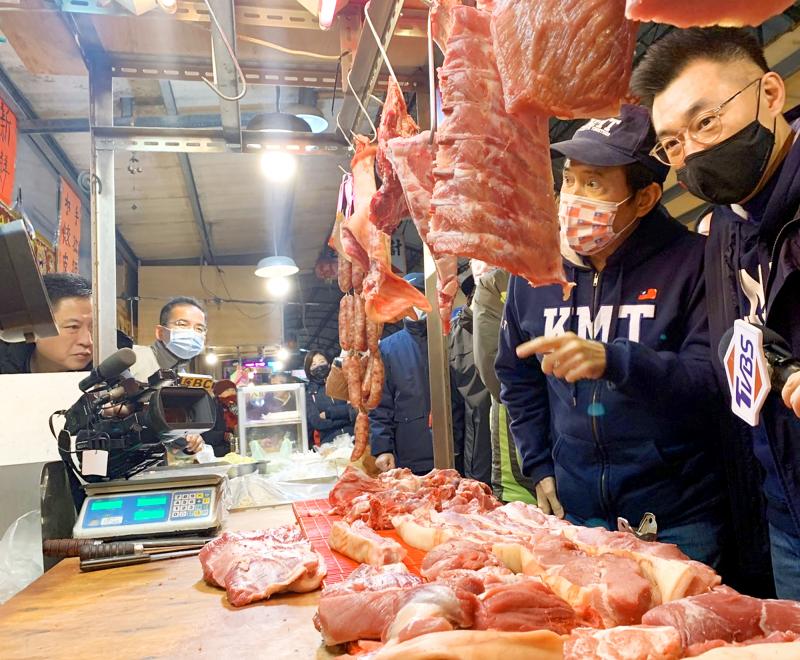The Chinese Nationalist Party (KMT) yesterday touted its proposed referendum on imports of pork containing traces of ractopamine after accusing the government of using strong-arm tactics to ease meat import regulations.
The members of President Tsai Ing-wen’s (蔡英文) administration “acted like bullies” by forcing the importation directives through the Democratic Progressive Party (DPP)-controlled legislature, and when the Executive Yuan annulled local governments’ regulations banning ractopamine in pork, KMT Chairman Johnny Chiang (江啟臣) said at a petition stand in Taoyuan’s Jhongli District (中壢).
“The KMT does not believe in letting people eat dubious food products, and that is why former president Ma Ying-jeou (馬英九) separated beef and pork [in import regulations], and banned the import of offal and meat from cattle over 30 months of age” during his presidency, Chiang said.

Photo: CNA
“Competent leaders should be able to resist political pressure to protect public health,” he added.
Passing a referendum has become more difficult after the DPP tightened the limits of the Referendum Act (公民投票法) in 2019, a reversal of its historical stance on the issue, Chiang said.
Referendums have now been decoupled from elections, and referendums are now held every two years on the fourth Saturday of August, with the next possible date being Aug. 28.
The KMT considers the law to be overly stringent and has submitted a proposed referendum to ease the restriction on referendums, in addition to the one on pork containing ractopamine, he said.
On Dec. 18 last year, the Central Election Commission said that the referendum proposal championed by Chiang and another by KMT Legislator Lin Wei-chou (林為州) complied with all regulations and could proceed to the second stage.
Chiang’s proposed referendum question would read: “Do you agree that referendums should be held on the same day as nationwide elections, if a nationwide election is scheduled to be held one to six months after a referendum proposal has been approved?”
Lin’s proposed referendum question would read: “Do you agree to a total ban on the importation of pork and related products containing leanness-enhancing additives (ractopamine and other beta agonists)?”
Under the act, the KMT has six months to collect nearly 290,000 valid signatures, or no less than 1.5 percent of the total electorate in the most recent presidential election.
However, the party is hoping to collect enough by March to have sufficient time to verify the signatures before Aug. 28.
The KMT yesterday launched a nationwide signature drive for its two referendum proposals.
Starting from yesterday, campaigning would take place in each of the 159 electoral districts that are represented by KMT lawmakers and county or city councilors, the party said.
People interested in taking part can download and print the petition free of charge at 7-Eleven stores nationwide using the self-serve ibon machines, the KMT said,
People should select the scan and print function, then the enterprises cloud drive, then ASUS cloud storage, and input ASUS6BIV6MG7S to open and print the file, the party said, adding that the form should be filled out, signed and mailed to the KMT’s headquarters.
The KMT’s official app would provide the locations of the KMT chapters’ liaison offices, elected officials and other partners to whom the petitions could be mailed, it said.

Chinese Nationalist Party (KMT) Chairman Eric Chu (朱立倫), spokeswoman Yang Chih-yu (楊智伃) and Legislator Hsieh Lung-chieh (謝龍介) would be summoned by police for questioning for leading an illegal assembly on Thursday evening last week, Minister of the Interior Liu Shyh-fang (劉世芳) said today. The three KMT officials led an assembly outside the Taipei City Prosecutors’ Office, a restricted area where public assembly is not allowed, protesting the questioning of several KMT staff and searches of KMT headquarters and offices in a recall petition forgery case. Chu, Yang and Hsieh are all suspected of contravening the Assembly and Parade Act (集會遊行法) by holding

PRAISE: Japanese visitor Takashi Kubota said the Taiwanese temple architecture images showcased in the AI Art Gallery were the most impressive displays he saw Taiwan does not have an official pavilion at the World Expo in Osaka, Japan, because of its diplomatic predicament, but the government-backed Tech World pavilion is drawing interest with its unique recreations of works by Taiwanese artists. The pavilion features an artificial intelligence (AI)-based art gallery showcasing works of famous Taiwanese artists from the Japanese colonial period using innovative technologies. Among its main simulated displays are Eastern gouache paintings by Chen Chin (陳進), Lin Yu-shan (林玉山) and Kuo Hsueh-hu (郭雪湖), who were the three young Taiwanese painters selected for the East Asian Painting exhibition in 1927. Gouache is a water-based

Taiwan would welcome the return of Honduras as a diplomatic ally if its next president decides to make such a move, Minister of Foreign Affairs Lin Chia-lung (林佳龍) said yesterday. “Of course, we would welcome Honduras if they want to restore diplomatic ties with Taiwan after their elections,” Lin said at a meeting of the legislature’s Foreign Affairs and National Defense Committee, when asked to comment on statements made by two of the three Honduran presidential candidates during the presidential campaign in the Central American country. Taiwan is paying close attention to the region as a whole in the wake of a

OFF-TARGET: More than 30,000 participants were expected to take part in the Games next month, but only 6,550 foreign and 19,400 Taiwanese athletes have registered Taipei city councilors yesterday blasted the organizers of next month’s World Masters Games over sudden timetable and venue changes, which they said have caused thousands of participants to back out of the international sporting event, among other organizational issues. They also cited visa delays and political interference by China as reasons many foreign athletes are requesting refunds for the event, to be held from May 17 to 30. Jointly organized by the Taipei and New Taipei City governments, the games have been rocked by numerous controversies since preparations began in 2020. Taipei City Councilor Lin Yen-feng (林延鳳) said yesterday that new measures by